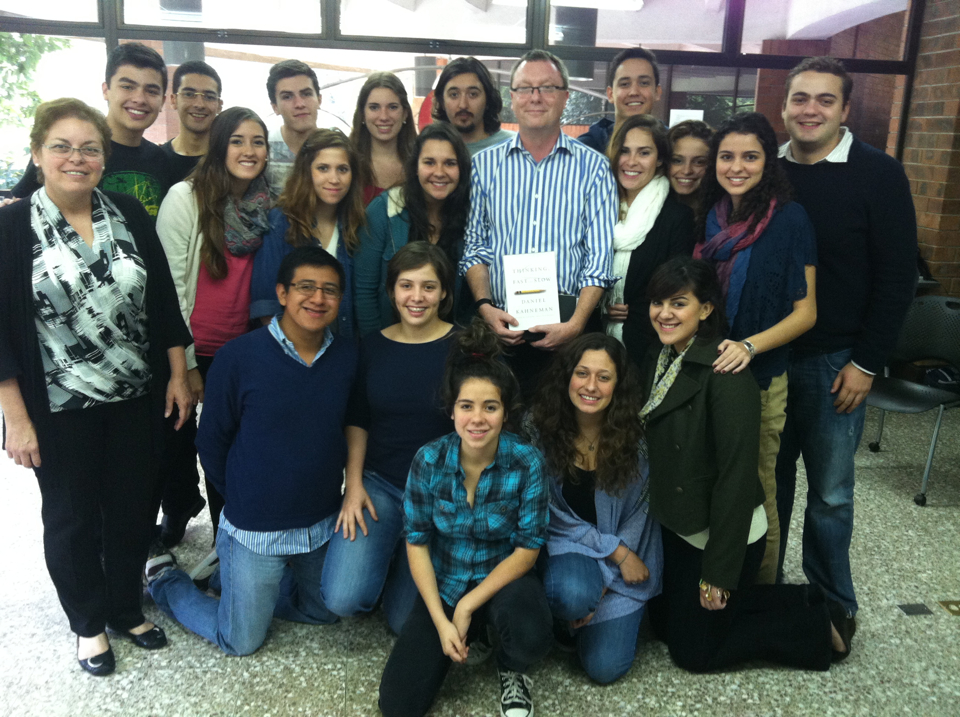So I didn't like math much. People didn't get engaged with the subject and made little group and started to gossip, while a little group was actually working in the problem.
Kyle came into the class, and that is what he saw. So he approached us, the group that was working, and started helping us. Even though his help was really useful, I tried to make the class more inviting and tried to turn on the projector. But because it didn't work, I gave up. Also, I called some people into the small group, and even though it worked, other people was just roaming around.
So we spoke about this at the debriefing, and people recognized that they were pretending that they knew when they didn't. This is a great step and can help us make the work better!
Kyle told us that he would arrive late, so the last group presented their Project Euler's problem: number 10. That problem is sick, insane! Haha,
This is what it prescribes:
The sum of the primes below 10 is 2 + 3 + 5 + 7 = 17.
Find the sum of all the primes below two million.
So, first I came to the idea that if we found a common sense in all prime numbers the formula could be done. But, there was an issue: Pablito mentioned that there's no formula to this beauty.
But still, I recognized that there are some numbers that if they were divided with primes, the remainder wouldn't be zero. These are the numbers we came up with:
2, 3, 7...
But, the theory was wrong. There are exceptions. So, we're still figuring out.
Dylan Evans, a multi-profession, "versatilist" man, visited the MPC headquarters. He's written a good amount of books, and he is really cool. He talked to us about his constant journeys around the world, and how psychology "isn't a science yet." I remember I asked why, and he said "we haven't acquired enough data yet." I don't agree with this argument. Actually, I think he even has the idea of how something becomes a science wrong. Science isn't dogma, it is a series of results that are result of observation and experimentation; and the study of the mind is something that is really complex to actually just put into words by saying that if this happens, then this is the way a human will act. Decisions are really complex, and I have to dig more into know about the psychology behind it. Dylan is a musician and he recommended us the book "thinking fast, slow." He talked us about behavioral psychology and how by memory people tend to accept or reject risks. He also talked about the virtue of laziness, and I had fun with that. I kind of agree.
So Grace's morning meeting was with some videos of dance. She showed us one of her favorite dances, and a video of herself dancing in the academy she attends to.
I do like a lot dancing, though I don't feel that the morning meeting was very well invested.
We recorded Euclid's Propositions 1, 2, and 3. It was a real challenge. Maintaining the presentation clear, quick and beautiful was a challenge (the students are all handsome, don't misinterpret.). But, I have to say I got kind of frustrated at the beginning, because the proposition I had to present, the second, is really long. I got confused with the continuity of the alphabetical pattern when making circles. I have some issues with "perfectionism". I can't end up something if it turns up the other way around as expected. So I presented my first draft of the videos for Euclid's presentation and it went pretty well. This is the feedback I received: - Be careful with the camera and the set (movements that go off the screen)
- Be nice. (I accept I was kind of frustrated.)
- Work on visual precision (the graphics weren't so accurate)
- Not covering my face with the paper that has the proposition written on it.
- I was clear, apparently :)
Today was Alejo's morning meeting. He decided to bring a clip of the movie Garden State to class, (watch it). Yes, and that is what we did: we marked a historical and unique moment in our lives. My thoughts about this? Well, it kind of reflects the amount of confidence we have on our community until now.
After that, we watched a clip of Steve Jobs: How do we see the world? Are we able to see the available opportunities and actually being aware that we can grab them and make them ours? Are we powerful enough, even when standing among the deepest and loud crowds? So much people are so pessimistic about this... and maybe that's why many people don't live their dream.
"It is easy in the world to live after the world's opinion; it is easy in solitude to live after our own; but the great man is he who in the midst of the crowd keeps with perfect sweetness the independence of solitude."
Emerson again. I can't stop quoting this marvelous work. There's something of a great man:
He is able to stand up by himself, not letting the "community of opinion" eat his strength.
He mentions this in his quote is "The objection t conforming to usages that have become dead to you is, that it scatters your force".
There's a "correct", "good" side in society in which you're just going with the flow and you don't have problems. But there's something inside us. This inside nature that actually makes us respond unconsciously to things we don't really l like: that's were fake smiles and reactions happen. ;)
So, first of all. We had some trouble with commitment. So, not even one of us had read the 22 pages a-day we were supposed to. Because of this matter, at least all of us had read the first chapter of the book.
So Bert asked the following question:
What is the Meta-Question of this chapter?
Several opinions started to spread around the room based in the topic of "Liberal Arts", "Education" and "Truth".
Suddenly, Pablito mentioned the following quote:
"The liberal arts, in contrast, teach one how to live; they train the faculties and bring them to perfection; they enable a person to rise above his material environment to live an intellectual, a rational, and therefore a free life in gaining truth."
This is a really interesting paragraph, in which at first I didn't understand the connection. But we then asked ourselves if the trivium was necessary so truth could be found. and yes. It is necessary! Of course we don't need a MPC everywhere that studies specifically the trivium, but still understanding the logic, grammar and the rhetoric of a matter is a necessary step to actually understand its truth. Even "unconsciously" we search for the different meanings but we need those three previous steps.
We returned to the meta question.
This is the one I have:
"How do we learn to search the truth?"
Being grateful is a virtue in most of the cases. Though, I don't know if it should be the only way of seeing the World. Like in "Celebrating what's right with the World" , there's a difference: we have to celebrate what's right to fix what is wrong. The message of Joel Osteen is basically that we have to be thankfulness and see what's positive... but let's go beyond that point of just trying to be positive over things we don't like and even more: that we can change. So what do you think? What is the difference between conformity and thankfulness? Is there a way to turn that around? Is thankfulness essentially related with conformity?
Today's debrief was pretty intense. We had to meet up as always at 1.30 PM. But not everyone was there in the circle and lots of my peers were roaming around the circle carelessly. Bert talked to me, and I told him a little of the highlight of my day. Alejo and Diego were there and they asked why we started without everyone there. Then the question came to the table. Should we change the rule then? Because we used to wait for others for debriefing time. Then, we decided that people should stay out of the circle if we come in late.
It wasn't a pleasant conversation because some refused to actually listen and to try to change the rule. But, at the end we decided that we should try. Still, I think democracy doesn't work for our decisions and we should be more careful with just trying that solution when we have to choose.
|


 RSS Feed
RSS Feed